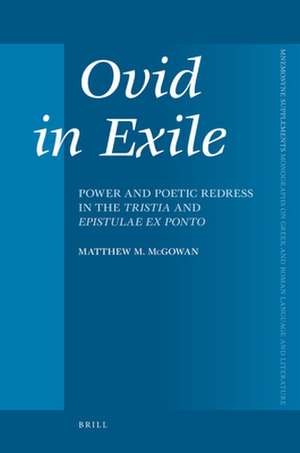Ovid in Exile: Power and Poetic Redress in the <i>Tristia</i> and <i>Epistulae ex Ponto</i>: Mnemosyne, Supplements, cartea 309
Autor Matthew McGowanen Limba Engleză Hardback – 23 apr 2009
Din seria Mnemosyne, Supplements
-
 Preț: 370.60 lei
Preț: 370.60 lei - 18%
 Preț: 735.03 lei
Preț: 735.03 lei - 18%
 Preț: 701.23 lei
Preț: 701.23 lei -
 Preț: 268.13 lei
Preț: 268.13 lei -
 Preț: 90.66 lei
Preț: 90.66 lei - 18%
 Preț: 584.00 lei
Preț: 584.00 lei -
 Preț: 169.79 lei
Preț: 169.79 lei -
 Preț: 216.33 lei
Preț: 216.33 lei - 18%
 Preț: 585.24 lei
Preț: 585.24 lei - 18%
 Preț: 581.90 lei
Preț: 581.90 lei - 18%
 Preț: 729.54 lei
Preț: 729.54 lei - 18%
 Preț: 657.49 lei
Preț: 657.49 lei - 15%
 Preț: 412.39 lei
Preț: 412.39 lei - 18%
 Preț: 708.10 lei
Preț: 708.10 lei - 18%
 Preț: 731.10 lei
Preț: 731.10 lei -
 Preț: 270.75 lei
Preț: 270.75 lei - 18%
 Preț: 730.72 lei
Preț: 730.72 lei - 18%
 Preț: 733.05 lei
Preț: 733.05 lei - 18%
 Preț: 586.33 lei
Preț: 586.33 lei - 18%
 Preț: 731.87 lei
Preț: 731.87 lei - 18%
 Preț: 586.17 lei
Preț: 586.17 lei - 18%
 Preț: 1544.97 lei
Preț: 1544.97 lei - 18%
 Preț: 731.64 lei
Preț: 731.64 lei - 18%
 Preț: 732.02 lei
Preț: 732.02 lei - 18%
 Preț: 972.52 lei
Preț: 972.52 lei - 18%
 Preț: 585.94 lei
Preț: 585.94 lei -
 Preț: 380.60 lei
Preț: 380.60 lei - 18%
 Preț: 718.29 lei
Preț: 718.29 lei - 18%
 Preț: 732.20 lei
Preț: 732.20 lei - 18%
 Preț: 586.25 lei
Preț: 586.25 lei - 18%
 Preț: 731.58 lei
Preț: 731.58 lei - 18%
 Preț: 1257.66 lei
Preț: 1257.66 lei - 18%
 Preț: 970.26 lei
Preț: 970.26 lei - 18%
 Preț: 557.29 lei
Preț: 557.29 lei - 18%
 Preț: 847.30 lei
Preț: 847.30 lei - 18%
 Preț: 732.43 lei
Preț: 732.43 lei - 18%
 Preț: 731.79 lei
Preț: 731.79 lei -
 Preț: 355.16 lei
Preț: 355.16 lei - 18%
 Preț: 588.13 lei
Preț: 588.13 lei - 18%
 Preț: 1211.54 lei
Preț: 1211.54 lei - 18%
 Preț: 586.10 lei
Preț: 586.10 lei - 18%
 Preț: 732.82 lei
Preț: 732.82 lei - 18%
 Preț: 732.34 lei
Preț: 732.34 lei - 18%
 Preț: 1484.10 lei
Preț: 1484.10 lei - 18%
 Preț: 731.58 lei
Preț: 731.58 lei - 18%
 Preț: 730.62 lei
Preț: 730.62 lei - 18%
 Preț: 732.02 lei
Preț: 732.02 lei - 18%
 Preț: 970.19 lei
Preț: 970.19 lei -
 Preț: 114.82 lei
Preț: 114.82 lei - 18%
 Preț: 731.87 lei
Preț: 731.87 lei
Preț: 716.26 lei
Preț vechi: 873.48 lei
-18% Nou
Puncte Express: 1074
Preț estimativ în valută:
137.06€ • 143.46$ • 114.07£
137.06€ • 143.46$ • 114.07£
Carte indisponibilă temporar
Doresc să fiu notificat când acest titlu va fi disponibil:
Se trimite...
Preluare comenzi: 021 569.72.76
Specificații
ISBN-13: 9789004170766
ISBN-10: 9004170766
Pagini: 262
Dimensiuni: 160 x 240 mm
Greutate: 0 kg
Editura: Brill
Colecția Brill
Seria Mnemosyne, Supplements
ISBN-10: 9004170766
Pagini: 262
Dimensiuni: 160 x 240 mm
Greutate: 0 kg
Editura: Brill
Colecția Brill
Seria Mnemosyne, Supplements
Notă biografică
Matthew M. McGowan, Ph.D. (2002) in Classics, New York University, is Assistant Professor of Classics at Fordham University in New York City. His research focuses on Latin poetry, ancient religion, and the classical tradition.
Recenzii
"McGowan demonstrates throughout the book that he is a careful and close reader, and repeatedly points out the multiplicity of interpretations available to readers in each of these poems. [...] McGowan’s most valuable contribution in this book is his analysis of the often avoided, and notoriously challenging, figure of Augustus which Ovid creates in these texts. Thus, McGowan’s work will be of use not only to scholars who study Ovid, but also to those who study imperial ideology; for these texts remain one of the few primary sources written about the emperor during this period." Sanjaya Thakur in BMCR, 22-8-2011
